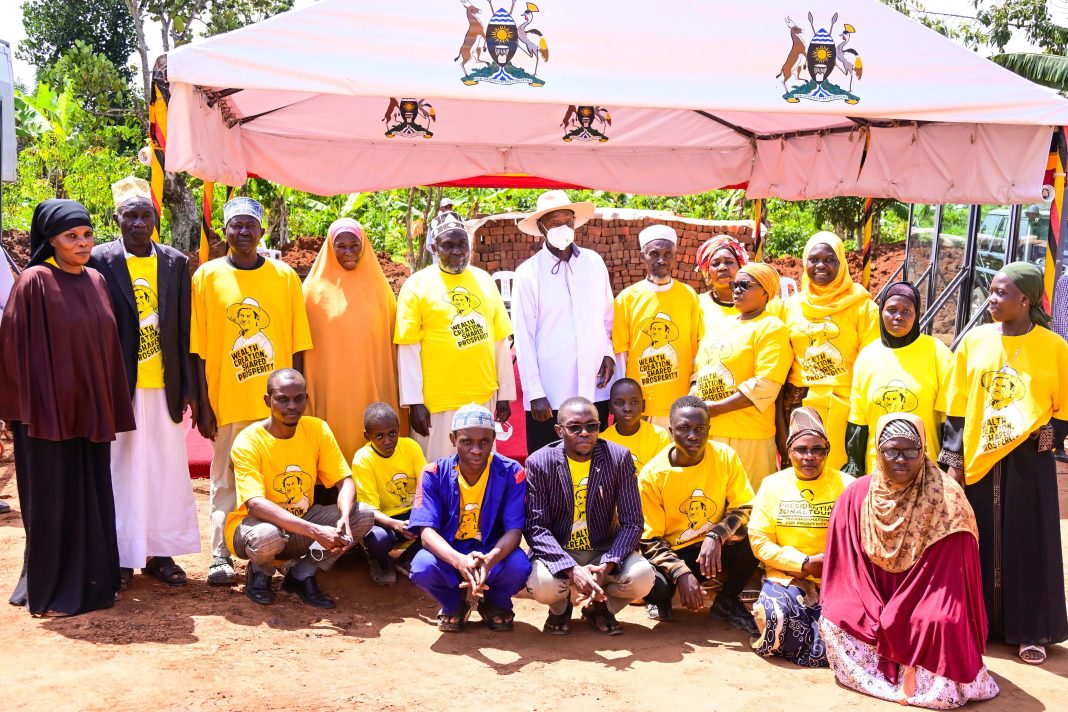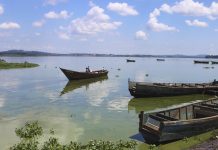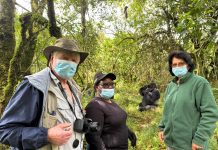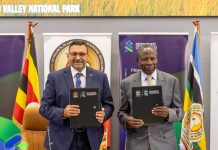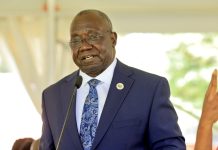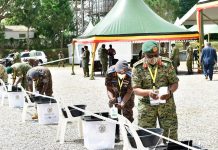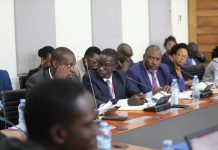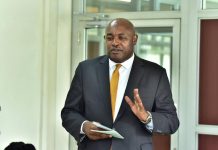President Yoweri Kaguta Museveni has praised Hajji Muhammad Yusuf Zziwa, a model farmer in Sselinya B Village, Mpigi District, for embracing and effectively demonstrating the National Resistance Movement (NRM) strategy of wealth creation through the four-acre model of farming.
While addressing residents during his tour of Hajji Zziwa’s Zimu Demonstration farm today, President Museveni commended the farmer for understanding and applying the NRM’s message on modern agricultural practices aimed at promoting household incomes on small plots of land.
He emphasized that even families with limited land can thrive if they adopt the four-acre model farming, a strategic system designed to turn subsistence farming into commercial success.
Under the four-acre model, President Museveni explained that one acre should be dedicated to coffee, another to fruits , a third acre to pasture for zero-grazing animals, and the fourth one to food crops for home consumption. He further recommended poultry in the backyard, piggery for non-Muslims, and fish farming on the edges of wetlands, depending on suitability. He also encouraged farmers to explore cocoa and palm oil growing, noting that these have proven highly profitable in other parts of the country, even on small pieces of land.
In a demonstration of government support, the President pledged to provide a solar-powered water pump to supply water to the entire village. He also donated a pickup truck to help Hajji Zziwa transport poultry feeds, which are currently sourced from as far as Mukono, thereby reducing logistical costs for the farmer.
Hajji Zziwa’s farming journey is a remarkable story of transformation. Starting with just one cow, he now produces 10 litres of milk daily, selling six litres and keeping the rest for family use, earning about UGX 360,000 every month. His poultry project has grown substantially, producing 55 trays of eggs daily. With each tray sold at UGX 10,000, Zziwa earns approximately UGX 550,000 a day from eggs alone. Annually, his poultry business generates a gross income of UGX 198 million, with expenditures totaling UGX 138 million, resulting in a net income of UGX 60 million.
Coffee has also become a key income stream for Hajji Zziwa. His plantation generates an annual gross income of UGX 68 million, with net earnings of around UGX 56.8 million after deducting expenses. The banana plantation adds UGX 4.8 million in gross income annually, with net profits of UGX 3.7 million. Additionally, his fruit venture, mainly focusing on avocados, brings in about UGX 720,000 annually. However, with production costs currently exceeding earnings for fruits, Zziwa is exploring strategies to increase profitability in that sector.
Overall, his four-acre farm generates a gross annual income of UGX 294 million. Diversifying his enterprise further, Hajji Zziwa has also ventured into herbal medicine, producing a locally recognized tooth remedy that has been verified by the National Drug Authority (NDA).
Despite his success, Hajji Zziwa highlighted key challenges still facing his enterprise, including high transport costs for poultry feeds, unstable feed prices, and persistent water shortages affecting both the farm and the wider community. Nevertheless, Hajji Zziwa’s farm has become a demonstration center, offering hands-on training and inspiration to other farmers in the region, positioning him as a model for wealth creation through integrated farming.
Former Mawokota North Member of Parliament, Hon. Amelia Kyambadde lauded Museveni President’s commitment to improving household incomes for ordinary Ugandans.
However, she expressed concerns over the pressure of population growth on local resources. She appealed for increased government investment in extending electricity, improving water supply, strengthening health services, and creating educational hubs equipped to provide practical, skills-based learning for young people.
Among her proposals were the construction of a hospital in the area, introduction of a ferry service to ease transport challenges, and the establishment of a zonal training hub for the youth to engage in modern agriculture and entrepreneurship.
In his response, President Museveni reaffirmed his government’s unwavering commitment to supporting farmers and transforming rural economies through strategic initiatives like the four-acre model. He emphasized that sustainable household wealth creation remains the cornerstone of Uganda’s long-term development agenda.


